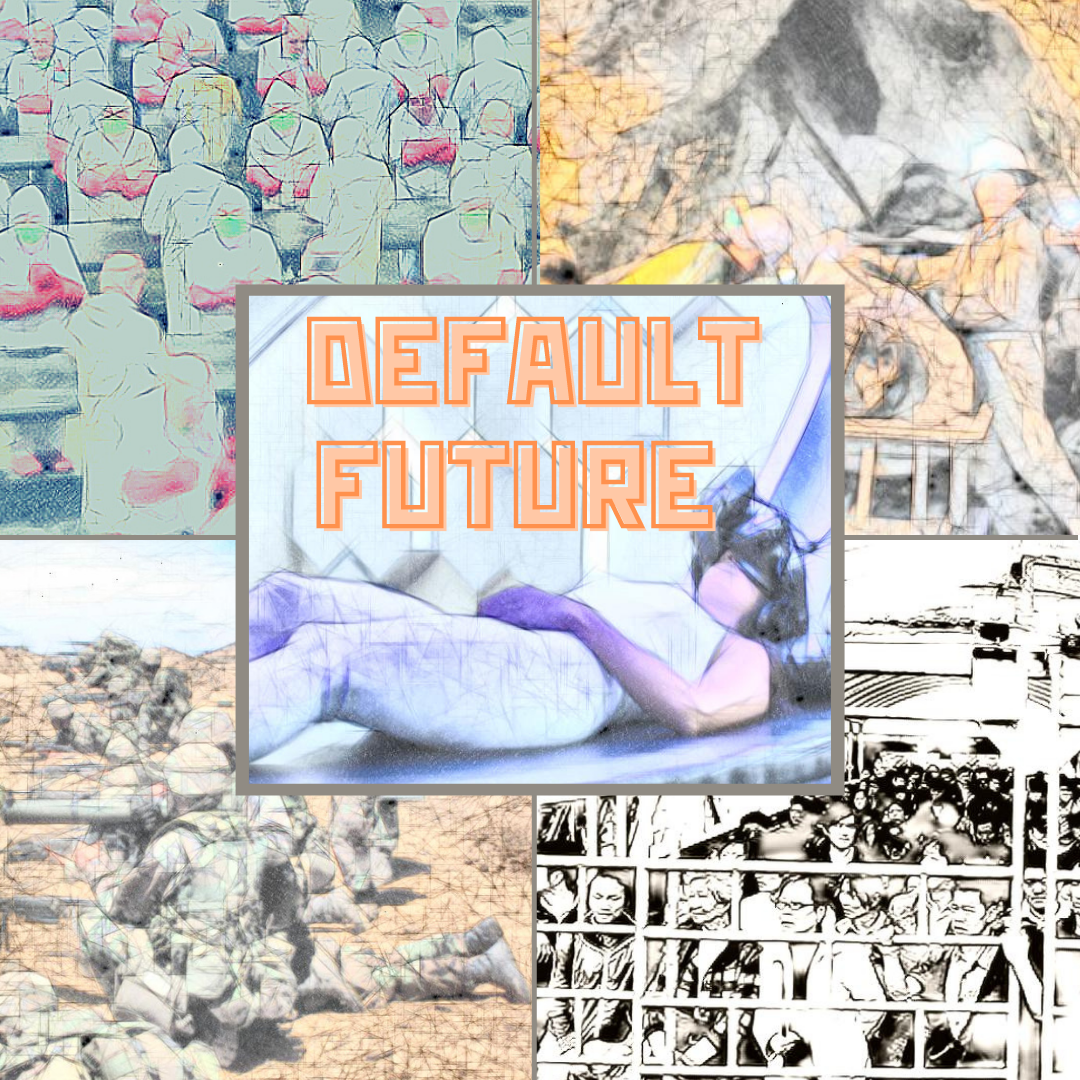Sub-Identity Suicide
Epistemic status: In this post, I attempt to describe a thought experiment that allowed me to overcome chronic depression and existential doubts. This is a metaphysical proposition and may not be amenable to a determination of its validity.
For many years, I was experiencing what I later learned to be existential depression. I remained externally happy and productive, but I had rational doubts about whether there was any purpose to life. As such, I could never commit to the belief that life was worth living. And it followed that I constantly questioned whether living was the right decision for me.
Then one evening, about three years ago, I figured out how to use a slightly more sophisticated formulation of Pascal's wager to end my depression outright. The result was a thought-experimental procedure that allowed me to remove all suicidal thoughts and tendencies. Now, I'd like to share the procedure that I built.
Below, I will try to articulate the steps I went through to formulate this idea. I hope that this can be used by others who are in need of something like its recipe for happiness. I'm incredibly nervous and embarrassed to share this story, but I feel it's one of the most useful things I've ever created. Feel free to judge the idea, but please try to avoid judging me personally if you don't sympathize with the sentiment that brought me to this result.
Thank you
Precursor: Quantum Mechanical Suicide
During my college and grad school years, I would undertake what my unstable mind considered a terribly clever, though risky, experiment. I would get blind, piss drunk—I mean complete blackout—and I would free climb buildings. One of my favorites was the Henry Hinds Geophysics building on the UChicago campus. It was incredibly easy to climb because of the bricks on the outside.

Still, for a 6 story building, a misstep near the top could easily have been fatal. Then once I got to the top, I would perch myself on the edge precariously. I assumed that any tiny miscalculation would send me over the edge.
I know this was stupid
I'm horribly embarrassed by my actions, but I mention it because some of this early, misguided thinking on this subject eventually led to somewhat more coherent revelations later.
The point of my behavior
By getting blackout drunk I was attempting to simulate an observerless experiment. I wanted to set up a situation like Schroedinger's cat, but with my drunken self as the cat. The idea was that my brain wasn't really able to record information while I was in a blackout state so I wasn't really "measuring" the outcome of the experiment. Since the experiment was without an "observer," this would leave me in a superposition of alive and dead. That is, until I sobered up, at which point the experiment would be over, and I would exist in a universe where I didn't fall off the building.
This was never a true quantum experiment in any scientific sense, however. And I never really committed to this dark experiment in any kind of real way. I just liked the sound of the idea so I played along for a while—until it got boring. And rather than ever really setting up the quantum experiment where I would kill myself with 50% probability, I faked it with my dramatic little cry for attention.

At any rate, you are currently living in one of the universe's where I survived. So if you read on, you can hear what this line of thinking eventually led to.
My real problem
Some time later, I came to better understand myself and what was driving me to feel depressed. I realized that I needed my life to have some purpose in order for me to feel like I should continue to exist. This is a personal need. I acknowledge that this isn't an absolute necessity for everyone, but I have recognized that it absolutely is a necessity for me. I've wondered if this is some biological reality of psyche, that my body just doesn't experience the minimum amount of pleasure to make trudging through life worth it. For whatever reason, there is no way for me to feel satisfied without a higher purpose being real.
Having made this realization, some people will just decide that they must believe in a higher purpose. Unfortunately, try as I might, I couldn't shake my very reasonable doubt. In fact, given the evidence I am shown of the world, I would be more likely to argue that there is actually NO higher purpose to life. This conflict was what left me cycling through frequent periods of depression
Once I understood this conundrum, I had to believe that even my depression was rational. I needed to maintain my doubt because it was probably correct. I needed to maintain my hope because it was required for my continued existence. I couldn't give up on life entirely and risk failing to find something that truly mattered. But doubt and hope were at constant war with each other. I couldn't use Pascal's Wager to wish away my true beliefs (I personally don't believe Pascal's Wager is valid because true belief is not something I can choose for the sake of utility).
Then little by little, a thought experiment crept into my head. It started as something very intuitive and wishy-washy, based loosely on the quantum suicide game I'd played with myself years ago. Then, as I ruminated on it further, I realized it might actually be a valid solution to my problem. Over a few days, I solidified my idea into a fairly cogent procedure with (reasonably) well-defined premises, corollaries, and conclusions. In the following sections, I outline my thinking on this subject and the logical steps required to reproduce my results.
Necessary Premises
There are a few preliminary assumptions required to make use of this thought-experiment. Each of these can be argued for or against in a number of ways. I'll outline my arguments as I've come to accept them, but I welcome discussion over the truth of these premises as well.
Premise 1: A Personal Need for a Higher Purpose
This procedure is only useful for those individuals who hold that some higher purpose is required to justify existence. Some people* may not need a higher purpose to their life in order to feel that life is worth living. For those for whom this premise does not hold, the remaining procedure is useless (and probably unnecessary). However, I believe that at least some other people may truly need that type of validation like myself. For those who know that they can't justify their existence without such a higher purpose, we can state
Some people cannot justify their existence without believing in a higher purpose. For such people, without certainty of a higher purpose, there is uncertainty about one's justification for existence.
Premise 2: Possibility of Purpose
It is not impossible for there to be a higher purpose to an individual human's existence. That is to say, a higher purpose has not been ruled out by any observation of physical reality. If we assume that any possible underlying real state of the universe that is consistent with our observations may be possible, there are certainly many such states which are also consistent with some higher purpose. As an example, the existence of an all-power deity who declares existence of a soul eternal and purposeful (ie like the Judeo-Christian God) would satisfy this condition. Although this being the true underlying state of the universe is improbable given other explanations for the existence of organized religion (social control), it is not impossible. Many other* theoretically valid possible states also can be proposed. As such, I state as a premise of my argument that
A higher purpose to our existence is not impossible.
*Again, my partner asked for a more believable example that could depict a reality where a higher purpose exists. I came up with this simple example. Imagine our experience of physical reality is part of a simulation where the output is fed into the generation of some permanent and knowable universal truth. This truth would then persist indefinitely in a meta-universe that is itself indefinitely sustained by the successful creation of experience from finite universes like our own. This is one not impossible, albeit non-falsifiable, realization of a purpose to our existence.
Premise 3: Existence of Abstract Ideas
This premise is required so that we may say that things that are ideas actually exist in a non-trivial way. I leave this as an exercise for the reader. If you believe that ideas do not exist, ask what that belief is and why you should be allowed to represent that belief to me.
Ideas can be said to exist as real things.
Premise 4: Composite Identity
The following is by far the most controversial premise, and it is one that I cannot argue must be true. Instead, this is more of a scientific, or observational premise, meaning one that is derived from experience rather than from abstract notions. So in reading this section, you must accept that this premise may only be intuited from personal experience. Nevertheless, I will describe my reason for this belief, and ask you to consider whether such a belief is congruent with your own worldview.
I believe that my identity is not monolithic. This means that my overall consciousness can be described using smaller units of consciousness. These smaller units of consciousness can be further subdivided, but, for simplicity, let us assume that we will stop dividing once we reach logically coherent decision making units.
Why do I hold this belief? I have simultaneously held two disparate thoughts in my mind at once. I have heard my own mind argue both sides of the morality of an action. There are observable underpinnings to this belief, such as the observation of hive minds or split identities after traumatic brain injury. While none of these are full proofs of the assertion, I take as a reasonable premise that
Our personal experience of a single unified identity, is a cognitive simplification of the composite of interconnected decision-making units that form our consciousness.
Corollary of Premises 3 and 4: Sub-Identities as Independent Actors
I'm not sure if this is an independent premise or a corollary of the two previous premises. Although, the constraints of our physical form cause us to only ever take a single physically manifested action on behalf of our identity, our "sub-identities" are still able to act independently in the space of ideas.
As an example to make this worldview more concrete, say we have two sub-identities that disagree about idea X. They may argue in the abstract space of ideas about idea X. They may build subsidiary beliefs based around their support or lack thereof for idea X. One subidentity may convince the other subidentity of the validity of some argument. This could have effects on other parts of the second subidentities belief system. In order to attain more information (call it datum Y), one or both subidentities would have to manifest the desire for more information into the physical world through action on the unifying identity. Nevertheless, one subidentity may choose to ignore datum Y when they learn it.
This example is just to illustrate the concept of unbridled independent action of subidentities as long as they are not interacting with the physical world. Or to put it another way
The subcomponents of an identity may perform independent actions in the space of ideas.
Conclusion: My depression was the existence of multiple conflicting sub-identities
The above set of premises presented a clear reason to me for why I was depressed. I was made up of disparate well-formed identities that held conflicting opinions about the validity of my existence. In short, I was composed of some set of subidentities that believed there was a purpose to life and therefore I should continue to live. However, I had other subidentities which held the consistent belief that I should not bother continuing to exist.
I had to find a way to resolve this tension.
The Identity Secession Procedure
Having established these premises, it is possible to carry out the following procedure.
Allow subidentities to self-annihilate in accordance with their own belief system.
Based on my globally held personal beliefs established above, all sub-identities that didn't believe there was a purpose to life also believed that they should act to terminate their existence. Similarly, all sub-identities that believed there was a purpose, should act to self-preserve. Therefore, at the end of this procedure, only the identities that believed in a purpose to life were remaining.
At this point my complete (composite) identity was now entirely composed of subidentities that truly believed that I should exist. My period of self-doubt and misery could rationally come to an end.
Aftermath (pun intended)
I can't say I've been purely happy for the three-or-so years since I discovered this procedure. However, I can say with no compunction that I have not thought for one moment that my existence was unwarranted. This system actually worked for me, and I hope that it could work for you too. In the time since then, I have had some other questions cross my mind about the procedure.
Was this fair? What are the implications for the world?
If I'm taking this procedure seriously, it means that I knowingly let some fractions of a human consciousness commit suicide. If many people try this same plan, then eventually you could posit that we'd be collectively killing the metaphysical equivalent of many persons. So there's an outstanding question about whether this is moral, given your considerations of suicide, and whether this concept of subidentity is truly additive. Taking another approach one could ask, "Is it fair to enter into this procedure, knowing that you are committing some subidentities to kill themselves willfully." I do not know the answer, but I could imagine arguments either way.
Another natural question is to apply the categorical imperative to this procedure. Would it be a good thing for everyone to do this? If they did, we would be left with a world without doubt about the value of our own existence. Again, I haven't yet comprehended the full morality of this theory. These are incredibly hard ethical concerns for me to argue given that I am so fully invested in the result, but I welcome discussion on the matter.
Who is left?
Finally, when one of my friends heard my description of this procedure, she asked a particular intelligent question: "Were there strong correlations between personality traits and sub-identities that terminated?" In other words, after the procedure, did my personality have to change because certain traits were possessed only by the "doubting" identities? I don't know for certain unfortunately, but I do certainly feel like a different person now.
 will stedden
will stedden

